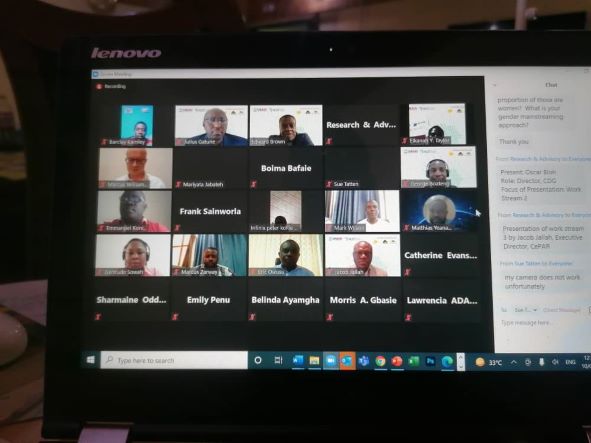By Frank Sainworla, Jr., fsainworla@yahoo.com
A virtual inception meeting to enhance regional collaboration on overcoming binding constraints on the growth of Liberia’s cocoa value chain took place on Thursday, with USAID promising more support to improve the sector and enhance this country’s development.
USAID is the United States Agency for International Development and it is funding the Liberia Economic Policy Dialogue Activity (LEPDA). This is “a four-year USAID-funded technical assistance, capacity development, and grants project that is working with the Liberian government and civil society to foster self-reliance by spurring private sector-led economic expansion.”
The February 10, 2022 inception meeting was organized by the African Center for Economic Transformation (ACET), Nathan Associates, and three Liberian civil society organizations, in collaboration with the Liberian Ministry of Agriculture.

The aim of the meeting was to engage key stakeholders on the project and enable the LEPDA team to fine-tune the nature, content, scope, and design of the proposed activities.
Speaking during the meeting, USAID LEPDA Chief of Party, Marcus Williamson said that the US government was providing various forms of technical assistance to the Liberian government in agricultural research and trade and build capacity.
He said USAID is committed to improving the capacity of civil society organizations (CSOs) to play a role as think-tanks, such as supporting them to implement policy-based research.
This will be a model for years to come that will contribute to Liberia’s development and transform the cocoa and agricultural sector, Mr. Williamson added.
LEPDA is one of the most high profile projects and USAID “takes it seriously” that will ensure that Liberian CSOs can be policy partners to government.
IREDD, Center for Democratic Governance (CDG) and CePAR are the three local CSOs participating in the ongoing project.
Dr. Edward k. Brown, Senior Director Research, Policy and Programs of ACET said one of the objectives of the program is to bring policymakers on board.
The goal he said is to transform and modernize Liberia’s cocoa and agricultural sector, enhance regional collaboration, stop illegal cross-border cocoa trade, improve quality, end monopoly and make the cocoa value chain a driver of Liberia’s agriculture development transformation.
ACET is a pan African institute, which Dr. Brown said has been able to define what is growth and development aimed at improving human wellbeing.
Dr. Brown informed the meeting that ACET has been involved in Liberia since 2009, from the formulation of the national aid policy to the creation of creation of the new Ministry of Finance and Development Planning (MFDP) several years ago.
Setting the stage for future research
Various presentations were made by Principal Researcher, Julius Gatune, the three CSOs and others during the virtual meeting.
Mr. Gatune said that the inception report was not the findings, but the initial assessment, which included literature review, set the stage for future research and data collection to come up with policies and regulations to transform the cocoa sector and improve quality.
He said the overall goal of LEPDA is to strengthen policy making capacity within government, design and improve implementation of specific reforms. So far, he said they have been able to gather that Liberia has 40,000 smallholder farmers.
Oscar Bloh, Director, CDG, Mariyata A. Jabateh, Project Associate, IREDD and Jacob Jallah, Executive Director of CePAR made presentations on three work stream, while ACET Researcher George Boateng made a presentation on the timeline of the project.
Streams one to three cover a number of areas, including political economy analysis, self-assessment by CSO on the challenges including their strength and weakness as think-tanks, Co-creation (learning by doing), communication and media engagement plan to be developed, stepping up engagement, engaging key stakeholders and critical value chain actors, among other things.
Prof. Akosua Keseboa Darkwa, Acting Dean, School of Information and Communication Studies, University of Ghana moderated the two-hour long virtual inception meeting on Thursday.
The Senior Director Research, Policy and Programs of ACET said there are lessons to be learned “to avoid pitfalls” by doing comparative analysis of top cocoa producing countries in West Africa by doing comparative analysis, so that Liberia can have maximum benefit.
“For African countries to transform, they need regional collaboration,“ Dr. Brown emphasized.

